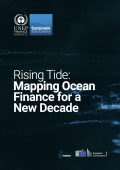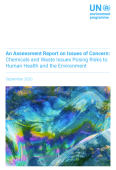
The Rising Tide report maps the current state of ocean finance revealing trends in lending, underwriting and investment activities which impact the ocean. It reveals the frameworks and financial instruments that are successfully addressing ocean sustainability and highlights new opportunities and gaps in the market. It looks across five major ocean-linked sectors chosen for their established connection with private finance: seafood, ports, maritime transport, coastal and marine tourism and marine renewable energy.
This forward-thinking report builds on the United Nations’ Sustainable Blue Economy Finance Principles.
A world-first, the United Nations’ Sustainable Blue Economy Finance Principles remain a keystone in the market, designed for financiers to align their activities with Sustainable Development Goal 14, ‘life below water’. By following these Principles, and building sustainable blue practices into their decision-making processes, the financial sector has a unique opportunity and a clear imperative to steer the ocean economy towards sustainability.
Fast Fashion has created cheap and abundant clothing globally, but the natural capital cost has been high, with toxic production practices, degradation of natural resources, massive and growing waste as well as labour injustice. By providing information and analysis on these problems, placing a value on them and quantifying the negative impact on profits and investor returns, Textiles Tracker will support and stimulate a transition to greater sustainability in the industry.
This report focuses on the financial risks arising from the extensive use and misuse of water in the wet processing stage of clothing production, with much of the global production effort situated in areas where water stress and the associated risk is already high.

